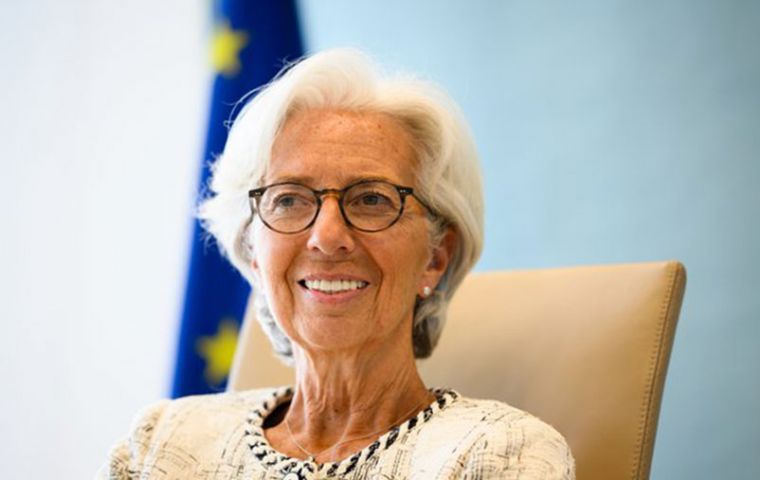MercoPress. South Atlantic News Agency
European Central Bank confirms expansive monetary policy
 ECB President Christine Lagarde said the current program is expected to last until “at least until March 2022”
ECB President Christine Lagarde said the current program is expected to last until “at least until March 2022” The European Central Bank confirmed its expansive monetary policy this week, in accordance with its recently reviewed inflation target and in a context of growing Covid 19 contagions that threaten recovery.
As expected the ECB kept its main interest rates remain at their lowest level, particularly negative 0,5% for banks deposits in ECB to force private banks to get money circulating. Likewise with the Covid 19 Pandemic Emergency Purchase Program, PEPP launched in March 2020. with 1,85 trillion Euros for the purchase of private and government debt to keep financial conditions fluid.
According to ECB President Christine Lagarde this program is expected to last until “at least until March 2022”, or in the case that ECB governors' council considers that the coronavirus situation is over“. However this situation seems to be losing predicament since the number of Covid 19 cases in Europe is again spiraling.
”The recovery of the economy in the Euro zone is in a good track, however the pandemic is overshadowing, particularly the Delta variant which constitutes a strong source of uncertainty“, said ECB chief Ms Lagarde. This concept was shared by outgoing German Chancellor Angela Merkel who pointed out the exponential expansion of Delta variant and the need for everybody to be vaccinated.
In this context of uncertainty the ECB only a couple of weeks ago anticipated it was abandoning its inflation target below 2% in the midterm, which had been official policy for the last eighteen years. However the new target has risen to 2% in the midterm is a more simple and flexible way. This means that the ECB will not react to deviations above or below the 2% target, as long as they are ”moderate and temporary”, a controversial definition in some financial circles, which also questioned its impact on the purchase of assets.
For the time being ECB retains its expansive monetary policy because it considers that the recent spike in prices, following years of sliding down, almost deflation, is temporary and because it expects inflation to drop back to 1,4% by 2023.
The annual inflation rate in the Euro Zone dropped slightly in June to 1,9% from 2% in May. If energy and food are excluded the aggregate was at 0.9%, which reflects weak inflationary pressures, particularly salaries and debilitated jobs market.
Normally when the index of prices climbs, financial markets fear an increase in interest rates. But with its new strategy the ECB argues that if the Euro zone economy faces a strong downturn, monetary policy must react forcibly and persistently to avoid the increase in prices (inflation) from not keeping to its target.




Top Comments
Disclaimer & comment rulesCommenting for this story is now closed.
If you have a Facebook account, become a fan and comment on our Facebook Page!